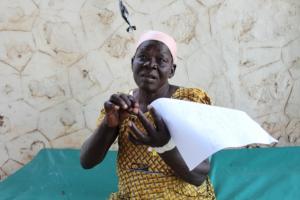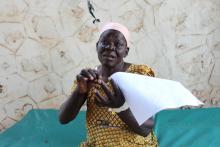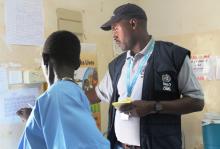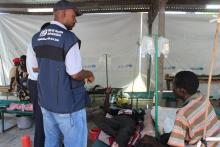Ministry of Health, WHO and partners score some victories in responding to cholera outbreak in South Sudan
Juba, 6 July 2015: Mary Wani frantically waves a paper from the hospital bed where she sits, eager to share the exciting news of her recovery and subsequent discharge from the ward with anyone who will listen to her.
“I am going home,” she says , adding that she feels very strong. The 58-year-old mother of nine has just been discharged from Juba Teaching Hospital, where she was receiving treatment for cholera. The hospital was the first Cholera Treatment Centre (CTC) to be designated in the current outbreak.
On 23 June 2015, the Minister of Health, Dr. Riek Gai Kok, declared a cholera outbreak in Juba County, Central Equatoria State, following the confirmation of cases by laboratory tests and reports of deaths.
So far three members of Mary’s family have been affected by cholera in the current outbreak, the other two being her 58-year old sister-in-law and nine year old niece. Ironically, Mary fell ill when she accompanied her two relatives to the hospital for treatment.
“I brought my niece and sister-in-law to the hospital for treatment and ended up staying too,” she says, adding that she developed diarrhoea, was vomiting and felt weak so she was also admitted. The other two were discharged a few days later, while she was detained for another day.
Mary and her family live in Gudele 1 in South Sudan’s capital city Juba, where the outbreak has been concentrated. Cases, initially reported in Protection of Civilians (PoC) sites, have spread to residential areas, while suspected cases have also been reported in the states and are being investigated.
As of 1 July 2015, a total of 523 cholera cases including 29 deaths (CFR 5.5%) had been reported from 75 villages in eight payams of Juba County. The sites reporting the majority of cases include New site, Gudele 1, Gudele 2 and Gumbo residential areas, as well as Juba 3 PoC.
In comparison, by 1 July 2014, a total of 2,540 cholera cases including 59 deaths (CFR 2.3%) had been reported in 16 counties of five states in South Sudan, in an outbreak that was declared on 15 May 2014.
“Although cholera is endemic in South Sudan, this time health partners were better prepared for an outbreak,” says Dr. Allan Mpairwe, Head of Outbreaks and Disaster Management (ODM) at the WHO Country Office in South Sudan. The late onset of the outbreak and lower number of cases this year, compared to last year, is largely attributed to pre-emptive measures taken by WHO and partners in support of the Ministry of Health. These include conducting Oral Cholera Vaccination (OCV) campaigns in vulnerable areas – Bentiu and Juba, updating cholera contingency plans at both national and state level before the onset of the rainy season, training state level rapid response teams (RRT) across the country and prepositioning diagnostic test kits and lifesaving supplies for managing cholera patients, which have helped to enhance surveillance, while enabling prompt response to suspected cases.
“The fact that the case was detected early shows that the surveillance system is effective,” says Dr. John Rumunu, Director General for Preventive Health Services in the Ministry Health, noting that there has been a marked improvement in surveillance compared to previous years.
A multi-sectoral response led by the National Cholera Task Force is being coordinated through the Ministry of Health, supported by the Health and Water, Sanitation and Hygiene (WASH) clusters. WHO, through the Health Cluster, is leading the health response.
New Oral Rehydration Points (ORP) have been set up in Gumbo and Gudele, where most of the cases are being reported, to bring services closer to people and reduce the burden on Juba Teaching Hospital. WHO is providing ORS module kits, Diarrhoea Disease kits, Infection Control supplies and tents in support of additional ORPs and CTCs.
Response to the cholera outbreak in South Sudan
Onsite laboratory testing of suspect cholera cases and microbiological culturing is ongoing with 84 of the samples being RDT positive while 33 have been confirmed by culture. WHO had prepositioned RDTs and cholera case management supplies to all 10 states before the onset of the rainy season and these are being replenished regularly. Documentation and investigation of emerging alerts is ongoing to facilitate rapid response to ongoing and emerging outbreaks. A total of 20 alerts have been registered and investigated since the onset of the current outbreak.
Refresher training to enhance the quality of services for hospital staff involved in case management took place at Juba Teaching Hospital on 1 and 2 July. Similar training has been planned for Bentiu, Bor, Malakal and Mingkaman.
WHO is supporting the Ministry of Health to produce daily situation reports, which help partners to better target their response activities.
Partners have intensified health and hygiene promotion, with social mobilisers conducting house to house campaigns to raise awareness, in addition to using various media that are popular in South Sudan such as the radio. WHO is providing technical support to ensure clarity and accuracy of messaging. So far this has paid off.
Community social mobilisers played a vital role in providing information that helped Mary to recognise the signs and symptoms of cholera and act promptly when her family members fell ill.
“I knew it was cholera because some people came to our home and told us about cholera, how it spreads, the signs and symptoms, as well as how to make oral rehydration salts,” she says. Although Mary takes utmost care to protect herself and her family by using treated borehole water and preparing food at home, she suspects that she was exposed to cholera when she visited relatives some days ago and had to drink untreated water from a stream.
In addition to responding to the outbreak, Health and Water, Sanitation and Hygiene (WASH) partners are supporting the Government to address risk factors. These include living in crowded IDP camp with poor sanitation and hygiene; using untreated water from the water tankers that ferry water from the River Nile; lack of household chlorination of drinking water; eating food from unregulated roadside food vendors or makeshift markets; poor hygiene practices like not washing hands at critical times; and open defecation or poor latrine use.
It is hoped that these coordinated efforts will help to reduce both cases and fatalities this year.
______________________________________________
Matilda Moyo | Communications Consultant | WHO Surge Team | Juba, South Sudan
Mobile: +211 955 036 439 | Email: whossinfo [at] gmail.com (whossinfo[at]gmail[dot]com) or matilda.moyo [at] gmail.com (matilda[dot]moyo[at]gmail[dot]com)
______________________________________________
1. Mary Wani is excited to be going home after recovering from cholera.
2. Dr. Allan Mpairwe, Head of Outbreaks and Disaster Management (ODM) at WHO discusses dally admissions with the Head Nurse at the Cholera Treatment Centre at Juba Teaching Hospital during a monitoring and support supervision visit.
3. Dr. Allan Mpairwe, Head of Outbreaks and Disaster Management (ODM) at WHO South Sudan dudng a supervisory visit to the Cholera Treatment Centre (CTC) at Juba Teaching Hospital as part of WHO support to the current outbreak.
4. Dr. Thomas Ujjiga Akim, Director of Epidemic Preparedness and Response (EPR) in the Ministry of Health and Dr. Allan Mpairwe, Head of Outbreaks and Disaster Management (ODM) at WHO South Sudan, discuss a consignment of supplies emergency medicines supplied through WHO support with the hospital pharmacist.
5. Dr. Allan Mpairwe, Head of Outbreaks and Disaster Management (ODM) at WHO South Sudan during a supervisory visit to the Cholera Treatment Centre (CrC) at Juba Teaching Hospital as part of WHO support to the current outbreak.
Credits: WHO/M.Moyo.


















